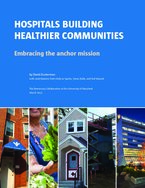Found 13 resources.
0
0
0
Tim Higashi and Stuart M. Butler look at several examples of innovative ways in which communities responded to COVID-19 by using a variety of special techniques to “braid and blend” funds from different programs and sources to address pressing health, education and other service need. They argue that such special flexible budgeting techniques should not end with the pandemic, but should become an integral feature of budget procedures to enable communities to reach social goals
Topics: Advocacy, Community development, COVID-19, Data sharing, Funding, Legislation & Policy
 Shared by Housing Is
on May 25, 2021
Shared by Housing Is
on May 25, 2021 0
0
0
Meet with members of CLPHA’s Postsecondary Leadership Institute to learn about how PHAs and postsecondary partners are working with students. Attendees will have a chance to hear short presentations about innovative approaches for improving postsecondary success and then ask questions in small groups.
Topics: CLPHA, Community development, Data sharing, Partnerships, Post-secondary
 Shared by Housing Is
on May 18, 2021
Shared by Housing Is
on May 18, 2021 0
0
0
Federal, state, and local policies focused on neighborhood improvement have long emphasized the need for community organizations to share information, coordinate activities, and collaborate in the delivery of services. These partnerships build “community capacity,” as a way of promoting local problem solving and community well-being over the longer term. But, there has been only limited research on which patterns of neighborhood networks are most conducive to implementing effective collective work. This report uses social network analysis, drawing from a network survey, and extensive field...
Topics: Communications, Community development, Data sharing, Legislation & Policy, Partnerships
 Shared by Housing Is
on Oct 15, 2020
Shared by Housing Is
on Oct 15, 2020 0
0
0
This environmental scan, conducted by AcademyHealth with support from the Kresge Foundation, provides an overview of the technology behind emerging multi-sector initiatives to address social determinants of health.
Topics: Community development, Data sharing, Health, Partnerships, Research
 Shared by Housing Is
on May 2, 2019
Shared by Housing Is
on May 2, 2019 0
0
0
To equip municipalities with the skills and tools to address these challenges, New York State created the $12 million Cities for Responsible Investment and Strategic Enforcement (Cities RISE) program, which provides leadership, management, and technical support to help 16 municipalities address deteriorating homes, vacant properties, and neighborhood decline through strategic code enforcement. Cities RISE uses code enforcement strategies to advance broader community development goals, and, in doing so, helps municipalities align programs aimed at improving residents’ quality of life.
Topics: Community development, Data sharing, Homelessness, Housing, Legislation & Policy, Partnerships
 Shared by Housing Is
on Mar 26, 2019
Shared by Housing Is
on Mar 26, 2019 0
0
0
After working with 37 communities across the country over the last three years to drive sustainable improvements in community health we’ve we’ve seen how when specific approaches are implemented, namely Bold, Upstream, Integrated, Local, and Data-Driven approaches, meaningful change affecting the health of a community can happen. We’ve done our best to document the processes, the successes, and the failures along the way, and from those real-world experiences we’ve created a set of preliminary tools that can inform and guide those interested in learning about the unique BUILD approach.
Topics: Community development, Data sharing, Health, Partnerships
 Shared by Housing Is
on Mar 19, 2019
Shared by Housing Is
on Mar 19, 2019 0
0
0
Vacant properties, substandard housing, and neighborhood quality profoundly affect our health, education, and safety. Strategic code enforcement programs can serve as communities’ first line of defense for addressing deteriorating homes, vacant properties, and neighborhood decline. Strategic code enforcement programs organize critical assets, resources, and actions into a dynamic and adaptive system.
Topics: Community development, Data sharing, Funding, Health, Legislation & Policy, Partnerships
 Shared by Housing Is
on Mar 14, 2019
Shared by Housing Is
on Mar 14, 2019 0
0
0
CLPHA’s Housing Is Initiative is engaged in a number of cross-sector activities focused on developing partnerships, facilitating a community of practice, resource development, promoting best practices, online collaboration, policy and advocacy, and training and education. Read about recent activities in this Fall Update.
Topics: Child welfare, CLPHA, Community development, Cost effectiveness, Data sharing, Early childhood, Education, Family engagement, Funding, Health, Homelessness, Housing, Low-income, Medicaid / Medicare, Mental health, Partnerships, Place-based, Post-secondary, Research, Stability, Substance abuse, Workforce development, Youth
0
0
0
This guide aims to provide resources and advice from the experiences of those in the NNIP network and other related organizations on developing a strong data governance program and protecting the security of confidential data.
Topics: Community development, Data sharing, Partnerships
0
0
0
Hospitals Building Healthier Communities aims to provide a resource for hospitals considering adopting or further integrating community engagement and economic development into their daily operations and their core mission.
Topics: Community development, Data sharing, Health, Housing, Low-income, Partnerships, Place-based, Research
 Shared by Housing Is
on Jul 13, 2018
Shared by Housing Is
on Jul 13, 2018 0
0
0
Reducing Pediatric Asthma through Home Improvements and Education
Topics: Asthma, Child welfare, Community development, Cost effectiveness, Data sharing, Early childhood, Education, Family engagement, Health, Healthy homes, Housing, Low-income, Medicaid / Medicare, Metrics, Partnerships, Place-based, Preventative care, Research, Safety
 Shared by Housing Is
on Jul 10, 2018
Shared by Housing Is
on Jul 10, 2018 0
0
0

Why do some neighborhoods appear able to launch effective local improvement initiatives, while others are more hampered by fragmentation and mistrust? Why can some communities mobilize diverse constituencies to influence public policy, while others cannot? Answers to these questions may be found in the specific patterns of collaboration that form among community organizations, and between these groups, schools, public agencies, and elected officials, according to MDRC, a preeminent social-policy research organization.
Topics: Asset building, Child welfare, Community development, Data sharing, Dual-generation, Education, Family engagement, Funding, Health, Housing, Legislation & Policy, Low-income, Metrics, Midwest, Mobility, Out-of-school time, Partnerships, Place-based, Preventative care, Research, Safety, Stability, Workforce development, Youth
0
0
0
Presentation from CLPHA's February 2018 Health Strategic Planning Workshop, co-facilitated with Health Impact Project and Grantmakers in Health
Topics: Affordable Care Act, CLPHA, Community development, Data sharing, Health, Healthy homes, Homelessness, Housing, Medicaid / Medicare, Mental health, Obesity, Partnerships, Place-based, Research, Supportive housing, TA
 Shared by Steve Lucas
on Feb 27, 2018
Shared by Steve Lucas
on Feb 27, 2018 



